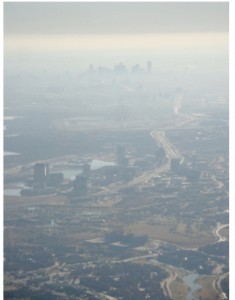ALA
No It Isn’t.
 It's unfortunate the Dallas Morning News chose to drink the Kool-Aid and say, that despite DFW once again getting an "F" from the American Lung Association for its smog levels, it "isn't as bad as it looks" because the air is "getting cleaner" than it was in…1999.
It's unfortunate the Dallas Morning News chose to drink the Kool-Aid and say, that despite DFW once again getting an "F" from the American Lung Association for its smog levels, it "isn't as bad as it looks" because the air is "getting cleaner" than it was in…1999.
And 20 years ago too probably, but what about compared to, say, 2010? In that more relevant comparison, the answer would be no, the air is not cleaner, it's in fact dirtier. The average concentration of smog has inched up over the past two years and the number of monitors in violation of the old 85 parts per billion ozone standard has increased from 2 to 7 in 2011 and 6 last year. That's not progress.
The DMN story also doesn't mention that the state has tried and failed twice with its "clean air plans" to reach the obsolete 1997 standard, and it forget to say we face a 2018 deadline to meet the new 75 ppb standard. But don't worry because the air is cleaner than it was in…1999! Even if it's still not safe or legal.
Public Overwhelmingly Approves of New Clean Air Initiatives
At the bottom of that same Politico articleon the suspension of new rule-making at EPA are the results of a national poll on clean air regulations done by Greenberg Quinlan Rosner Researched, paid for by the American Lung Association, conducted February 27th to March 4th with a margin of error of 3.5 points either way. The results are not a surprise if you've been following polling on this subject for a while – there are always overwhelming majorities in support of additional efforts to clean up air pollution. But if you live some place like Texas, and/or you've been closely following the GOP presidential nominating contest, you might get the feeling that most people think the air they're breathing is hunky-dory and want the EPA to permanently close-up shop. Nope. 66% of those polled strongly favor or somewhat favor the EPA's updating of air pollution standards with stricter limits vs. 28% who strongly or somewhat opposed that effort. 37% didn't think EPA was strict enough in its regulation of air pollution vs 11% who thought the agency was too strict (14% unsure and 38% "about right"). 78% favored stricter limits on Mercury, 72% favored stricter limits on smog, 70% favored stricter limits on Carbon Dioxide (CO2) and even 60% favored new tailpipe emissions and gasoline standards – knowing that these new rules could directly affect them. 73% think new limits on greenhouse gas emissions will have a positive effect on public health and air quality and even a plurality of 44% believe these standards will have a positive impact on the economy. No, you're not crazy. You're not the anomaly – your elected officials are.
How Much Silence Has Chesapeake Bought for Its Lung Association Investment? UPDATED WITH GOOD NEWS
It pains us to have to write about this because the American Lung Association stood with Downwinders throughout the mid-to- late 1990's and helped us turn the tide against the burning of hazardous wastes in the Midlothian cement plants. And we also understand how hard it is to raise money for non-profits with a recession/depression still going on. But in accepting Chesapeake's money, totaling at least $500,000 and probably much more, what is the price ALA has to pay as air quality in areas like DFW gets sabotaged by wave after wave of gas production pollution? ALA was a no-show during the EPA and TCEQ summer hearings on new gas emissions regulation. They've taken no part in the struggle to write a new Dallas gas drilling ordinance despite their regional HQ being in Dallas and hiring a new "Environmental Health" staff person to take on the job of helping community groups fight for cleaner air. They've published no reports on Barnett Shale emissions, despite it being the single largest threat to DFW air quality progress in the last decade. One can't help but wonder if the group would be more outspoken had it not received Chesapeake's cash deposits. Big Gas has warped every institution and group it's touched in North Texas, and here's one more example of an organization that appears to be letting down it guard over public health in return for contributions from them. Et Tu, ALA? FRIDAY UPDATE: We're happy to report that the ALA, along with the American Public Health Association, the American Thoracic Society, the Asthma And Allergy Foundation of America, and the Trust for America's Health sent a very good letter to EPA supporting "the strongest possible standards to reduce harmful emissions from the production wells, processing plants, transmission pipelines and storage units within the oil and gas industry," because "research has shown that these pollutants can cause cancer, developmental disorders, and premature death." Moreover the letter supports the demand of citizens in the Shale that want to see the new EPA rules cover EXISTING wells along with new ones that are now targeted. In total, it's the strongest letter to date from anyone at ALA on fracking and represents a huge step forward in the organization's articulation of the various public health harms of the practice. We're relieved to see that Chesapeake didn't buy the conscience of the ALA when its checks were cashed by the group. Now that the ALA is on the record as supporting tougher air emissions strategies for fracking, we hope the local Lung Association in DFW will find ways to insert staff resources into the numerous manifestations of the national battle going on right here in North Texas, starting with the writing of new Dallas and Denton gas drilling ordinances, and the renewed struggle to obtain safe and legal air for the region.
